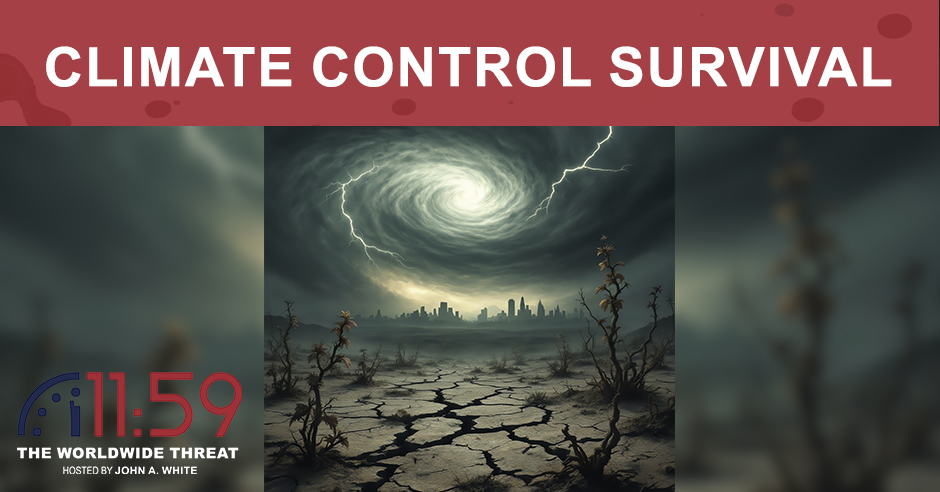Climate Control Survival

What if climate control isn't just about carbon emissions, but also about the food we eat? In this episode, Richard H. Schwartz, a leading expert on sustainability and veganism, unveils the shocking link between animal agriculture and the climate crisis. Richard, author of Vegan Revolution: Saving Our World, Revitalizing Judaism, shares how shifting to plant-based diets can help us combat global warming and protect future generations. With over four decades of advocacy, Richard offers compelling insights on why this change is critical—straight from Israel, where veganism is rapidly gaining ground. Tune in for a thought-provoking conversation that could change how you view climate control.
---
Listen to the podcast here
Climate Control Survival
Richard H. Schwartz On Veganism
Richard is Emeritus of Jewish Veg, Center of Jewish Food Ethics. He's also President of the Society of Ethical and Religious Veterinarians. He's an associate producer of A Sacred Duty and a member of the Jewish Vegan Life Executive Council, which is at JewishVeganLife.org. For over four decades, Richard has engaged with two ethically rich ways of living that, as he charts in his book, he came to appreciate Judaism and veganism.
---
In this episode, we're going to speak about climate control survival with expert Richard H. Schwartz. Richard is in Israel, which is a blessing for us. Our expert is a PhD and Professor Emeritus of the College of Staten Island and a resident of Israel. Tell us a little bit about yourself.
I came to Israel several years ago at the age of 82. I'm 90 and living here with my wife and 2 daughters. It's wonderful. I'm being very active in trying to bring and get the message out that the world has to address the climate crisis.
What you write about, we'll discuss that in a minute. The climate crisis, did that lead you to become more into this idea of the vegan revolution?
The Impact Of Animal Agriculture On The Climate Crisis
Yeah. The main causes of a climate crisis are verily in animal-based diets and animal agriculture. That's because the cows, 1 to 2 million of them, admit methane, which is a very potent greenhouse gas. It's still happening. The Amazon rainforest is being cut down. We're converting land that used to have trees that absorb dioxide. Instead of that, we have cows belting out methane, a very potent greenhouse gas.

Even more than that, 43% of the land in the whole world is supposed to be for animal agriculture. That is for grazing of the animals and growing feed crops of the animals. Since so many trees have been cut down, it has changed from 6 trillion thousands of years ago to about 3 trillion. There's less carbon dioxide being absorbed and the carbon dioxide in the atmosphere is at a very dangerous level. That's one of the main causes. For some examples of climate threats, there are so many heat waves that this year of 2024 has already been declared to be the hottest year on Racket since about the 1880s. That's the forecast Racket that was created last year in 2023.
Based on that, do you think that we're going to be facing a severe winter this 2024?
In general, we've had very severe storms. An amazing thing is that Spain had a whole year's rain in eight hours. There were two tremendous hurricanes in the Southeastern part of the US. There are three reasons why the storms are more severe. It's because the waters are higher so there is more of a storm surge. The atmosphere is warmer so there is more moisture. You get more rain when that occurs. The most important is that the weather is so hot that you can have a tropical storm approaching the land. That happened with the two severe hurricanes in the Southeast US. It could be a tropical storm but as it gets closer to land, it grows in intensity. It could be a category 4 or 5 hurricane.
We're in North Carolina so we faced that in the Western part of our state with Helene, which is still a problem. This book you wrote called The Vegan Revolution: Saving Our World, Revitalizing Judaism, is that a guide to help people? Tell us more about the book.
It's a gardener's sense because if there's going to be even a chance to better a climate catastrophe with one more warming, storms, heat waves, and wildfires, there has to be a shift toward vegan diets because we need more trees. We're cutting them down instead of creating more trees. We need them because the carbon dioxide keeps it from too dangerous a level. The climate experts think instead of going down, it's increasing by 2 or 3 parts per million per year. There's a whole bunch of substitutes. Even long-time vegans can't tell the difference between the plant substitute and the meat. It has a very similar appearance, texture, and taste. People can still have the taste they crave without the killing of animals, without many negative health effects, and without the many environmental threats that animal-based diets have, including the greatest threat to humanity, which is climate change.
The greatest threat to humanity is climate change.
What would you say to my audience to give them peace in their lives and their families about a practical way to implement these ideas?
Practical Steps Toward A Vegan Lifestyle And Climate Change Mitigation
The most important thing is if we want to have a healthy, environmental, and sustainable world for future generations, then it's extremely important to shift to plant-based diets. We have all those substitutes that can make a difference. There's been a vegan revolution. There are more vegan restaurants. Even those that serve meat always have quite a number of vegan options. There are many recipes.
It's a matter of making the change. By doing so, you're helping your own health. It is very important as well in helping the health of humanity. Unless this change happens, the world's going to continue warming up and there will be more storms. For animals, a tremendous amount of irrigation water is needed. It can take as much as thirteen times as much water on an animal-based diet than on a plant-based diet.
That's interesting. My wife even mentioned this idea. Since you're in Israel and you were here as well, what would be your comparison to what we're doing in the US compared to what's going on in Israel?
Israel is considered one of the leading nations in terms of veganism, especially in Tel Aviv. More young people are moving in that direction. Things are happening in Israel. In the US, unfortunately, it is not fast enough and not enough because of vicious cycles. For example, when there are these wildfires in California and other places, a lot of energy would be needed to rebuild the many houses and cars destroyed by the fire.
That's some very good advice that you're giving. I'm sure many people tuning in to this show are going to love to know about that. We're going to do our action guide. We're going to point people to your book, which I believe is on Amazon. Also, you have some websites that we're going to put into the action guide.
People think they talk about climate and all that but they really don't think about what you've laid out, which is appreciated. Thank you for taking your day out. I know it's late there. We appreciate you spending time with us. The wealth of information is amazing. Have a great evening. Get some rest. We look forward to speaking to you again soon.
Many thanks. I appreciate this opportunity. I hope people will be in touch and look at my website with over 300 articles. In addition to everything else, it reduces the possibility of future pandemics. Many pandemics in the past have been due to the raising of animals in very cruel, unsanitary ways. Many thanks and all the best.
We'll make sure we get that information out to everybody besides this episode so they can get to all those articles. That's a lot of work that you've done. We appreciate your time. Blessings to you. Thank you again.
Thank you. Many thanks. All the best.
